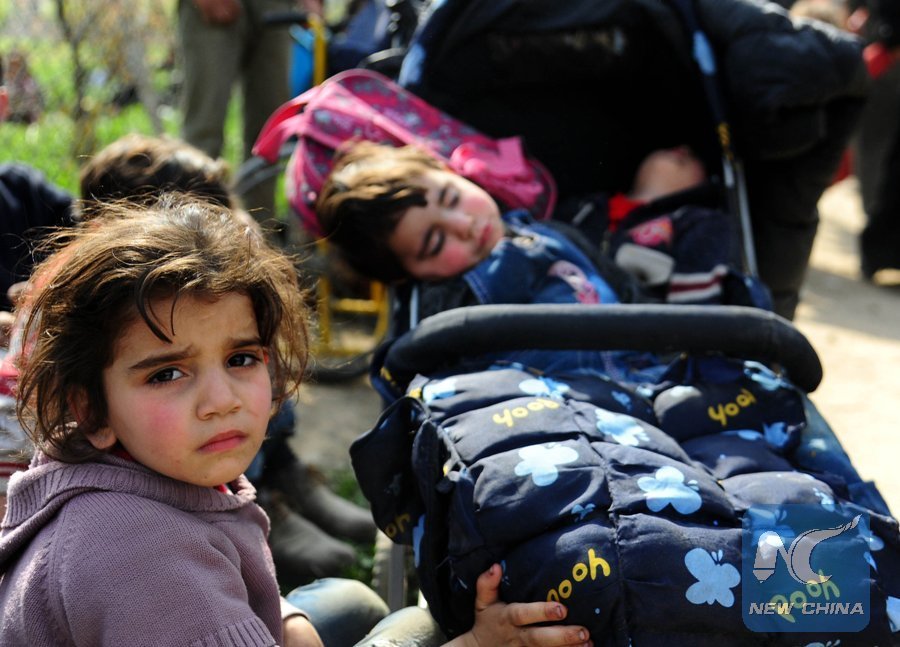
Children wait to be transferred to a safe shelter from the Hamouriyeh area in Eastern Ghouta of Damascus, Syria, on March 17, 2018. (Xinhua/Ammar Safarjalani)
UNITED NATIONS, June 27 (Xinhua) -- Over 21,000 grave violations of children's rights have been verified by the UN as a result of armed conflict in 2017, a drastic increase of 15,500 from the previous year, a UN secretary-general special representative said Wednesday, describing the trend as "despicable."
At a press briefing launching the annual report of the secretary-general on children and armed conflict, Virginia Gamba said that some 15,000 violations were perpetrated by non-state armed groups and about 6,000 were committed by government forces.
The crises unfolding in the Central African Republic (CAR), the Democratic Republic of the Congo (DRC), Myanmar, South Sudan, Syria and Yemen brought about serious increases in verified grave violations, the report said.
In Syria, children have suffered the highest number of verified violations ever recorded in the country. In the DRC, crises in the Kasais led to an eightfold increase of attacks on schools and hospitals, which numbered 515, according to the report.
On top of that, Afghanistan suffered the highest conflict-related child casualty, Gamba added.
"The report details the unspeakable violence children have been faced with, and shows how in too many conflict situations, parties to conflict have an utter disregard for any measures that could contribute to shielding the most vulnerable from the impact of war," she said.
DIRECT IMPACT
In a despicable trend, almost half of the 881 verified child casualties in Nigeria resulted from suicide attacks, including the use of children as human bombs.
Over 10,000 children were killed or maimed in 2017 with numbers growing substantially in Iraq and Myanmar, while remaining unacceptably high in Afghanistan and Syria.
In South Sudan, violence against children continued unabated with 1,221 children verified recruited and used. Rape and other forms of sexual violence against children remained disturbingly high with over 900 verified cases against boys and girls.
"This shows a blatant disregard for international law by parties to conflict, making civilians, especially children, increasingly vulnerable to violence, use and abuse," Gamba said.
DETENTION
The number of children detained for their alleged association with armed groups remained extremely worrisome, noted the report.
For instance, in Iraq, at least 1,036 children were held in juvenile detention facilities on national security-related charges, mostly for their alleged association with ISIS.
In Nigeria, over 1,900 children were held in custody because of their or their parents' alleged association with Boko Haram.
In the report, the secretary-general reminded the authorities that children formerly associated with armed groups should be treated primarily as victims and detention only used as a last resort.
ABDUCTIONS AND DENIAL OF AID
The report also noted that large-scale abductions of children remained a worrying trend.
In Somalia, Al-Shabab abducted over 1,600 children, many of which were also victims of recruitment and use or sexual violence.
Massive cross-border recruitment by actors such as ISIS and Boko Haram was also documented as a continuous trend requiring concerted regional efforts.
Another disturbing trend was the denial of humanitarian access used as a tactic of war.
Children in Myanmar, South Sudan, Syria and Yemen were prevented from receiving life-saving support.
In Syria, 400,000 persons, including children, trapped in besieged areas such as Ghutah and rural Damascus, faced deteriorating living conditions.
PROGRESS
One positive development Gamba pointed out is that over 10,000 children were formally released from armed groups and forces to commence their reintegration process.
She said some 8,000 children were recruited by armed groups and forces, giving a net outflow of 2,000 children from under their control.
The special representative also stressed her team has increased engagement with parties to conflict to improve the situation.
In Sudan, the government forces have been delisted for the recruitment and use of children following the completion of their action plan with the UN, she said.
In Colombia, as part of the peace process, the FARC-EP put in place measures to release children and prevent their recruitment and has been delisted.
Several armed groups, including those in Myanmar and CAR, have expressed their readiness to sign action plans with the UN.
"Enhanced engagement between my office and parties to conflict is more likely to bear fruit when coordinated supporting action is also available," Gamba concluded.

